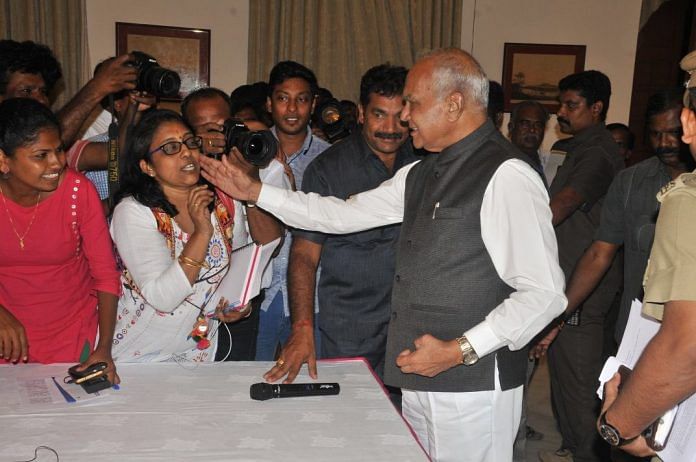Can women journalists afford to antagonise an influential old man only because he pulled or patted our cheek or casually asked us if we’re married?
In the past 24 hours, journalists across the country have reacted to the picture of a public official patting a woman reporter on her cheek when she asked him a question.
It happens with women journalists all the time. We are harassed, infantilised or spoken dismissively to, and it is all part of developing a “thick skin”. So, in our bid to develop that thick skin, and not be left behind for being “too sensitive”, we shut up and go about our jobs.
It is not news that men talk to women patronisingly. They do so when the woman is not your stereotypical babe-in-the-woods; they do it when she is. The onus is invariably on the woman to appear like she can’t be messed with — an invisible, badgering preoccupation that men almost never have to bother with.
The patter-in-question here was Tamil Nadu governor Banwarilal Purohit. He has defended himself, saying that it was “an act of appreciation” and that he considered her his “granddaughter”.
The reply came after the scribe, Lakshmi Subramanian, wrote to him saying his act had left her “angered and agitated”.
“You didn’t answer my questions, but you decided to patronisingly, and without my consent, pat on (sic) my cheek as a reply. To you, it might be a mark of appreciation, and a ‘grandfatherly’ gesture…But to me, it was an uninvited gesture as I wanted only answers and not a pat on my cheek,” she wrote.
Most of us don’t have her courage to call out such behaviour. The stakes are simply too high. For those of us younger in the profession, it is even worse. Can we afford to antagonise an influential old man only because he pulled our cheek or casually asked us if we’re married or not? We hear men glibly tell us all the time that “you feminist types” are too prickly. But the truth is that till the time the transgression does not pass our own egregiousness test, we don’t even bother speaking up.
A few months ago, I was introduced to a senior RSS hardliner by a source. The hardliner, my source told me, is like their “karta-dharta”. I must not miss the opportunity to meet him, I was told. When I met him, he said hello to me and put his hand over my head.
“I’d like to meet you sometime when you are relatively free,” I told him.
“I would be happy to meet you if you come like my daughter,” he said.
But I’d rather you meet me like a journalist, I protested.
He then pulled my ear, and said “we deal differently with journalists”, suggesting he’d rather not exhibit his true self to ‘a chit of a girl’ like me. I ignored and went about my work for the day.
Then, last month, I walked into the office of a bureaucrat I had never met before. He greeted me with a smile unusual for a bureaucrat, and asked me to take a seat. As I attempted to start a conversation, I struggled to have him look me in the eye, and not stare pointedly at my blouse.
Obviously, he was not registering my questions either. So, I turned my seat away so as to have my shoulder, instead of my chest, face him. He acted visibly offended. He looked at me, agitated, and abruptly ended the meeting, saying, “You can speak to our media officer, I am busy now.” I got up and left.
And then it happened again. Earlier this month, a retired judge was sharing with me how exasperating it is to see “jhola-type” women lawyers obsess over Article 21 of the Constitution. “They can’t see anything but liberty, rights, freedom,” he said with dismay. “Most of them are not even married, and are fighting cases in family courts. Us, family men, are more equipped to deal with such cases; at least we know how a family works,” he added.
I forced myself to smile.
As I was getting up to leave, he said, “Waise beta, aap married ho ya aap bhi Article 21 type (Are you married or are you also one of those Article 21 types)?” I said, sheepishly, “Article 21 type,” and laughed the matter off.
Article 21 deals with a citizen’s right to life and personal liberty.
There are other instances that one simply ignores, because what would speaking up fetch us except losing potential sources, and not being seen as “real journalists” with thick skins?
One ought not think that the Tamil Nadu governor’s “grandfatherly” gesture is an aberration. Lakshmi Subramanian calling him out is an aberration.



